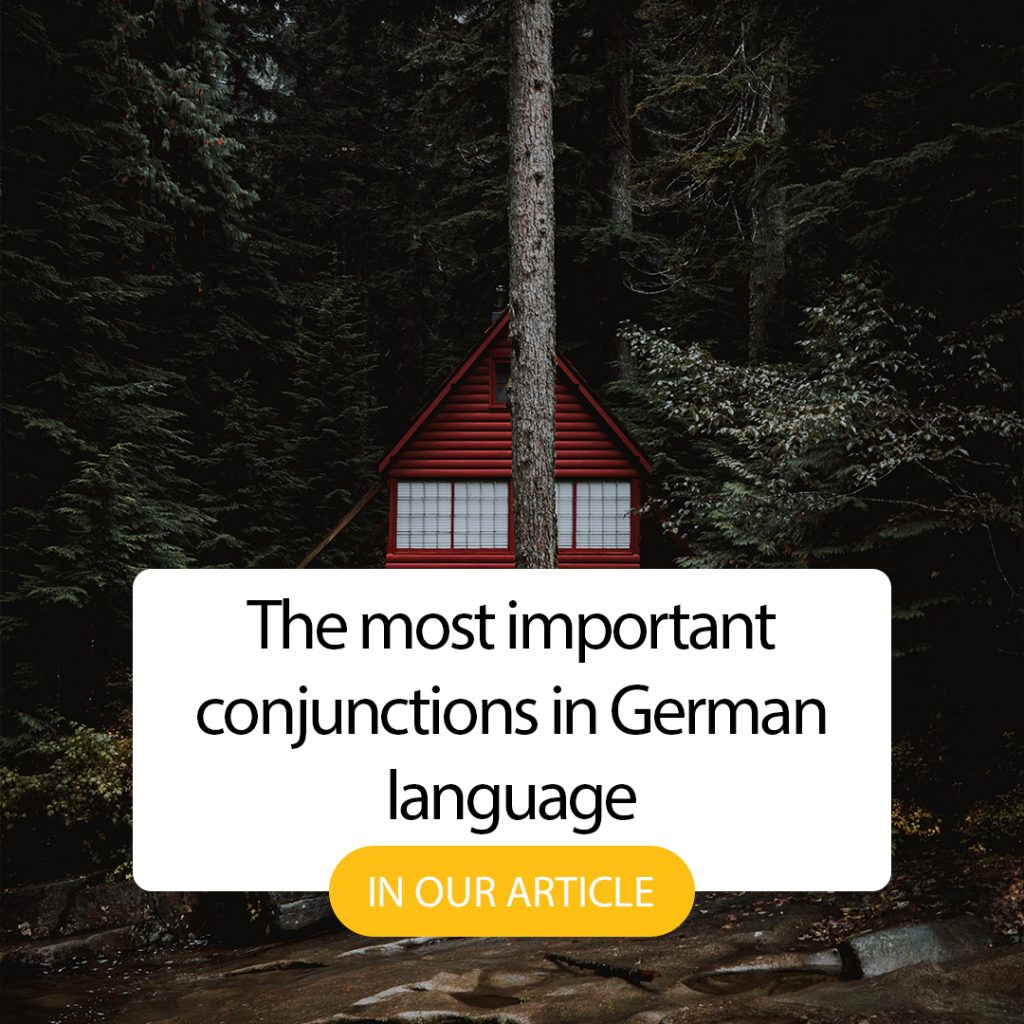We talked a lot about conjunctions in German. We discussed how they influence the order of words and what they mean. We offer you a list of all the most mentioned associations. We divide them into three groups:
Unions that take a zero position (do not affect the order of words): “und” (“and”), “denn” (“because”), “aber” (“but”), “oder” (“or”), “nicht…, sondern” (“not…, a”).
Ich habe ihn gesehen, aber er hat mir nicht “hallo” gesagt – I saw him, but he didn’t say hello to me;
Ich gehehe heute allein in eine Kneipe, oder wir gehen dort zusammen – I’m going to beer alone today, or we’re going there together.
The second group of unions is the unions that take the first position in the sentence and require verbs immediately afterwards: “außerdem” (“besides”), “also” (“thus”), “zuerst” (“first”), “danach” (“after that”), “dann” (“then”), “deshalb/deswegen/darum/daher” (“and therefore”), “trotzdem/ dennoch” (“despite that”), “sonst” (“otherwise”).
Er hat mir sehr geholfen, außerdem hat er mir nach Hause begleitet – he helped me a lot, and he also took me home;
Er ist krank,also bleibt er zuhause – he is sick, so (in this way) he stays home;
Zuerst essen wir, danach gehen wir ins Kino – first we eat, then (after that) we go to the movies;
Wann du heute Zeit hast, dann treffen wir uns – If you have time today, then (in that case) we will meet;
Er hat keine Zeit, deshalb kocht er nie – he doesn’t have time, so he never cooks;
Es regnete draußen, trotzdem habe ich das Fahrrad genommen – it rained outside, despite this (and yet) I took the bike;
Komm zu mir, sonst bin ich allein – come to me, otherwise I will be alone.
The last group is the unions, after which the verb is sent to the end of the sentence, because they combine the main and the adjunct sentence: “dass” (“what”), “ob” (“whether”), “als”, “wenn” (“when”), “nachdem” (“after”), “seit(dem)” (“since”), “sobald” (“as soon as”), “solange” (“before, while”), “während” (“for now, while”), “bevor” (“before”), “bis” (“down to”), “obwohl” (“though”), “weil/da” (“because”), “indem” (“because”).
Ich hoffe, dass du heute zu mir kommst – I hope you will come to me today;
Ich weiß nicht, ob ich das machen kann – I don’t know if I can do that;
Sag mir, wenn du fertig bist – tell me when you’re done;
Nachdem ich das gehört habe, gibt es keine Zweifel mehr – after I have heard it, there is no doubt anymore;
Seitdem ich Sport mache, mag ich Fußball – since I started playing sports, I like football. It differs from “nachdem” in that two things happen and are relevant at the same time;
Sobald ich sie sehe, sage ich dir – as soon as I see it, I’ll tell you;
Solange du den Herd nicht nicht reparierst, kann ich nicht kochen – until you fix the stove, I can’t cook.
Während Anna auf dem Bett schläft, räumt Peter das Zimmer auf – while Anna sleeps on the bed, Peter cleans the room;
Kannst du das machen, bevor ich zur Arbeit gehe? – Can you do this before I go to work?
Bis du alle Hausaufgaben machst, bleibe ich in deinem Zimmer – until you do all the lessons, I will stay in your room;
Obwohl es draußen regnete, habe ich das Fahrrad genommen – although it rained outside, I took the bike;
Er kocht nie, weil er keine Zeit hat – he never prepares because he has no time;
Meine Cousine hilft mir, indem sie die Küche aufräumt – my cousin helps me by cleaning the kitchen.
All the “W-Wörter” words – the words in “w”: “was”, “wer”, “wo” (“where”) and similar words that are used to build the question – also belong to the words of the alliance, after which the verb is put at the end of the sentence.
Sag mir, was du mitgebracht hast – tell me what you brought.
Weißt du, wer das gemacht hat? – Do you know who did it?
And this group includes allied words: “der” (“who”), “die” (“who”), “dem” (“who”) and the like, which we have considered in a separate article.
Das ist die Frau, die du schon kennst is a woman you already know;
Das ist der Mann, dem ich immer helfe is the man I always help;
It is very important to know the order that this or that union requires. After all, the lack of order of words is a serious grammatical error in the German language.

